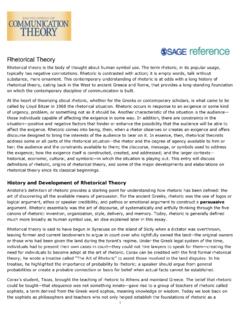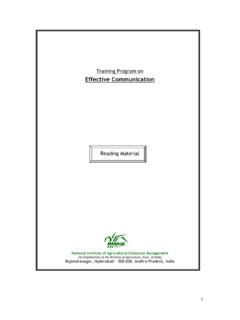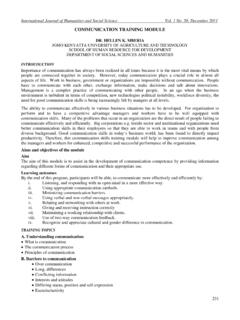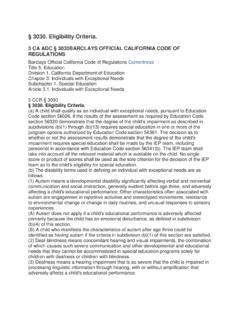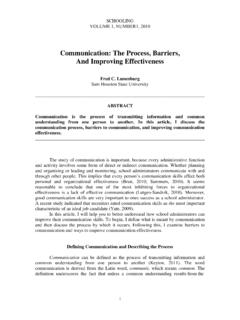Transcription of Teaching Culture in the EFL/ESL Classroom - ed
1 1 Running head: Teaching Culture in the EFL/ESL Classroom Teaching Culture in the EFL/ESL Classroom Tran-Hoang-Thu Alliant International University San Diego, California September 11th 2010 Paper presented at The Los Angeles Regional California Teachers of English to Speakers of Other Languages, Fullerton, California, September 11th 2010. 2 Teaching Culture in the EFL/ESL Classroom Abstract This article is intended to discuss prominent issues in Teaching Culture to second and foreign language students. The concepts of language and Culture will be defined, respectively. Next, the characteristics and components of Culture will be presented. In addition, commonly used terms in language and Culture including enculturation, acculturation, cultural awareness, cross-cultural awareness, cultural identity, Culture shock, and Culture bump will be discussed, compared and contrasted.
2 The relationship between language and Culture will also be pointed out. Moreover, factors such as teachers, curricula, and textbooks that have an impact on the success and failure of Teaching Culture to second and foreign language students will be examined. Besides, various views on Culture in language learning will be explored. The hidden assumptions of Culture learning and Teaching when language teachers embrace the bandwagon of communicative language Teaching approach will be addressed. Additionally, techniques for Teaching cultural awareness and ways to integrate Culture learning into the foreign and second language classrooms will too be described. Furthermore, some practical guidelines on accounting for cultural issues for language Classroom teachers will be indicated.
3 The advantages and disadvantages of Teaching Culture in the language Classroom will be mentioned. Finally, some discussion and conclusion will be made. 3 Teaching Culture in the EFL/ESL Classroom Introduction In this era of information and technology explosion, peoples in the world come into contact with one another more often and more easily than ever before. The need for mastering a foreign or second language besides one s own seems to dramatically grow. More people are learning languages for their personal and professional needs. Although the field of language Teaching has done an excellent job to increasingly better accommodate the needs of language learners, the field may have to do even more and better to address the various needs of language learners.
4 Specifically, cultural aspects of the language being learned must be taught concurrently with the linguistic aspects, which have traditionally been emphasized. Teaching Culture to foreign or second language students may not be a novel topic, as it has repeatedly been discussed by a whole host of authors such as Atkinson (1999), Blatchford (1986), Brown (1986), Brown (2007a), Brown and Eisterhold (2004), Brooks (1986), Damen (1987), Morgan and Cain (2000), Tang (1999), Tang (2006), Valdes (1986), to name but a few. However, after decades of development in language Teaching , one might wonder if Culture has increasingly become an important component in the language curriculum as well as in the training programs for language teachers.
5 Likewise, it may not be clear if researchers and authors in language Teaching are still interested in finding out effective methods to integrate Culture in second and foreign language classrooms. To that end, this paper attempts to partially shed some light on this issue. Before any discussion on the relationship between language and Culture can be carried out, it is first necessary to discuss some common terms such as language, Culture , enculturation, 4 Teaching Culture in the EFL/ESL Classroom acculturation, Culture awareness, cross-cultural awareness, cultural identity, Culture bump, and Culture shock. An understanding of these basic terms will enable one to realize the importance of Culture in language learning and Teaching .
6 What is language? Language has been around since human beings started to communicate with one another for their daily life needs. The term language is so familiar that few people would ever try to define it. It is superficially not hard to define it, but in fact to have a comprehensive definition of language is an extremely daunting task. Definitions for language run the gamut from very simple to extremely complex. Patrikis (1988) simply defined language as signs that convey meanings. Language is also a system of signs that is seen as having itself a cultural value (Kramsch, 1998, p. 3). From a linguistic perspective, Sapir (1968), a renowned linguist, defined language as an entirely human and non-intrinsic method of communicating ideas, emotions, and desires by means of a system of voluntarily produced symbols.
7 Generally speaking, language can be regarded as a system of verbal and nonverbal signs used to express meanings. Besides language, another closely related concept that is sometimes mentioned in the literature of language Teaching is Culture . What is Culture ? One of the well-known definitions of Culture is Goodenough s (1957)..a society s Culture consists of whatever it is one has to know or believe in order to operate in a manner acceptable to its members, and to do so in any role that they accept for any one of themselves (p. 167). 5 Teaching Culture in the EFL/ESL Classroom Brown (2007), however, defined Culture as a way of life, as the context within which people exist, think, feel, and relate to others, as the glue (p.)
8 188) that binds groups of people together. Moreover, Culture , as Brown (2007) suggested, can also be defined as the ideas, customs, skills, arts, and tools that characterize a certain group of people in a given period of time. Sowden (2007) indicated that Culture tended to mean that body of social, artistic, and intellectual traditions associated historically with a particular social, ethnic or national group (pp. 304-305). Additionally, Mead (1961) postulated that Culture can be learned, whereas Fox (1999) noted that Culture is relative and changeable in space and time (p. 90). Like language, Culture may seem to be another concept that is not easy to define. In fact, Tang (2006) rightly observed that despite the continued efforts in various disciplinary fields to find a definition for the term Culture , at the present time there is no single definition that satisfies everyone.
9 According to the National Standards for Foreign Language Learning (1996), Culture is typically understood to include the philosophical perspectives, the behavioral practices, and both tangible and intangible products of a society. The relationship between perspectives, practices, and products within Culture is illustrated below. Figure 1: What constitutes Culture ? (The National Standards for Foreign Language Learning, 1996, p. 43) Perspectives (Meanings, attitudes, values, ideas) Practices Products (Patterns of social interactions) (Books, tools, foods, laws, music, games) 6 Teaching Culture in the EFL/ESL Classroom What are the characteristics and components of Culture ?
10 Although the task of defining Culture may be difficult, it appears that characteristics and components of Culture can be identified. Damen (1987) presented six notable characteristics of Culture . 1. Culture is learned. 2. Cultures and cultural patterns change. 3. Culture is a universal fact of human life. 4. Cultures provide sets of unique and interrelated, selected blueprints for living and accompanying sets of values and beliefs to support these blueprints. 5. Language and Culture are closely related and interactive. 6. Culture functions as a filtering device between its bearers and the great range of stimuli presented by the environment. Additionally, Damen (1987) also suggested that Culture can be examined from the point of view of its individual components (such as dress, systems of rewards and punishments, uses of time and space, fashions of eating, means of communication , family relationships, beliefs and values), or from the more social point of view of its systems (such as kinship, education, economy, government association, and health).










